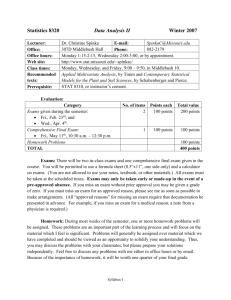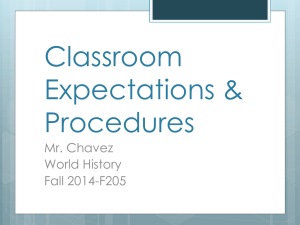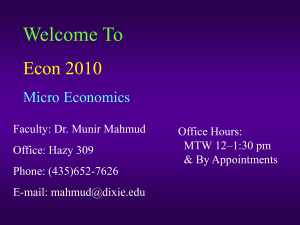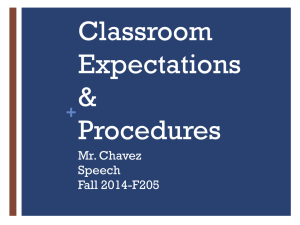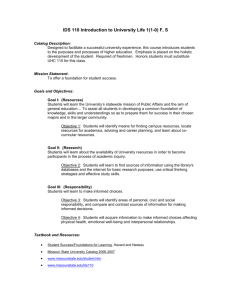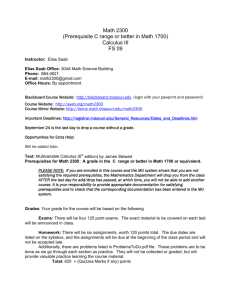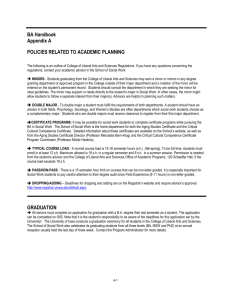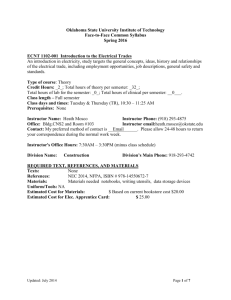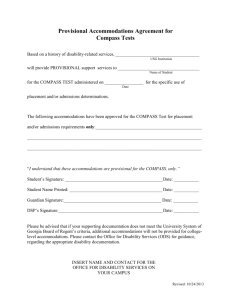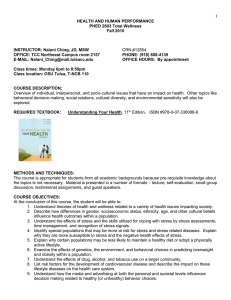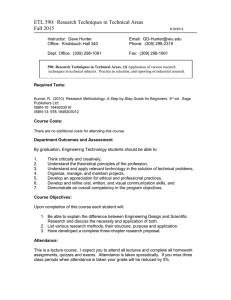STAT 8220 Applied Statistical Models II.
advertisement
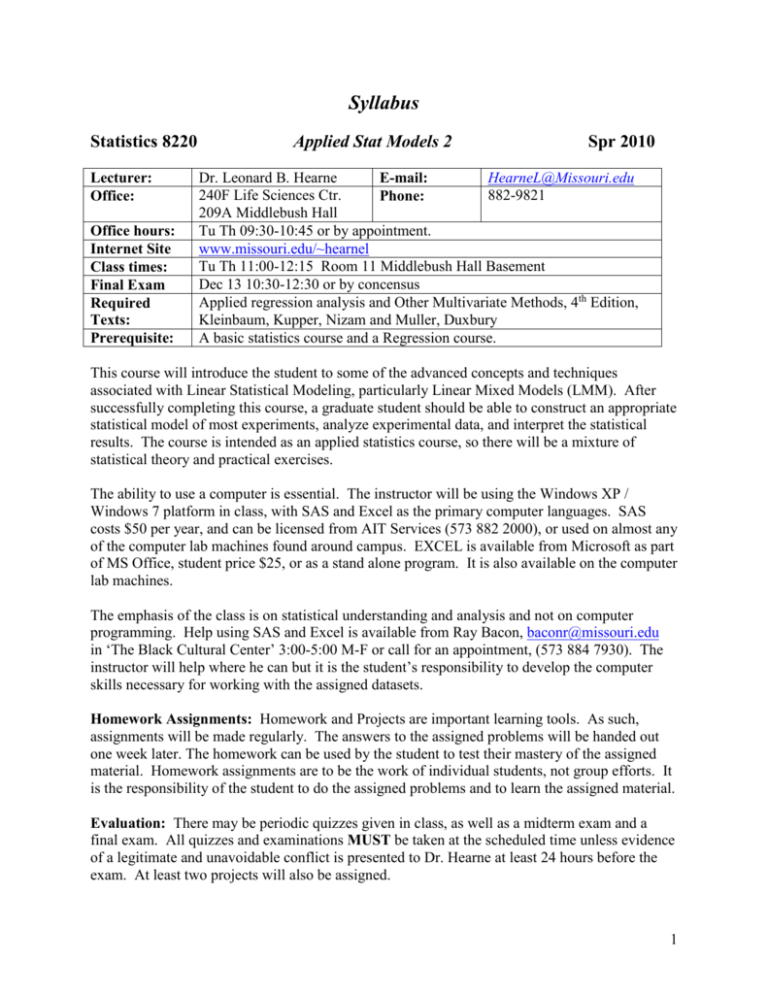
Syllabus Statistics 8220 Lecturer: Office: Office hours: Internet Site Class times: Final Exam Required Texts: Prerequisite: Applied Stat Models 2 Spr 2010 Dr. Leonard B. Hearne HearneL@Missouri.edu E-mail: 240F Life Sciences Ctr. 882-9821 Phone: 209A Middlebush Hall Tu Th 09:30-10:45 or by appointment. www.missouri.edu/~hearnel Tu Th 11:00-12:15 Room 11 Middlebush Hall Basement Dec 13 10:30-12:30 or by concensus Applied regression analysis and Other Multivariate Methods, 4th Edition, Kleinbaum, Kupper, Nizam and Muller, Duxbury A basic statistics course and a Regression course. This course will introduce the student to some of the advanced concepts and techniques associated with Linear Statistical Modeling, particularly Linear Mixed Models (LMM). After successfully completing this course, a graduate student should be able to construct an appropriate statistical model of most experiments, analyze experimental data, and interpret the statistical results. The course is intended as an applied statistics course, so there will be a mixture of statistical theory and practical exercises. The ability to use a computer is essential. The instructor will be using the Windows XP / Windows 7 platform in class, with SAS and Excel as the primary computer languages. SAS costs $50 per year, and can be licensed from AIT Services (573 882 2000), or used on almost any of the computer lab machines found around campus. EXCEL is available from Microsoft as part of MS Office, student price $25, or as a stand alone program. It is also available on the computer lab machines. The emphasis of the class is on statistical understanding and analysis and not on computer programming. Help using SAS and Excel is available from Ray Bacon, baconr@missouri.edu in ‘The Black Cultural Center’ 3:00-5:00 M-F or call for an appointment, (573 884 7930). The instructor will help where he can but it is the student’s responsibility to develop the computer skills necessary for working with the assigned datasets. Homework Assignments: Homework and Projects are important learning tools. As such, assignments will be made regularly. The answers to the assigned problems will be handed out one week later. The homework can be used by the student to test their mastery of the assigned material. Homework assignments are to be the work of individual students, not group efforts. It is the responsibility of the student to do the assigned problems and to learn the assigned material. Evaluation: There may be periodic quizzes given in class, as well as a midterm exam and a final exam. All quizzes and examinations MUST be taken at the scheduled time unless evidence of a legitimate and unavoidable conflict is presented to Dr. Hearne at least 24 hours before the exam. At least two projects will also be assigned. 1 Your course grade will be determined based on your relative total point standing in the class. That is, your grade will be based on the total number of points that you have accumulated over the course of the semester relative to the number of points that others in your class have accumulated. Points will be given for the following: Homework 50 points/ all homework Quizzes 50 points/all quizzes Projects 50 points/all projects Midterm Exam 100 points Final Exam 150 points Note cards: Every student is required to turn in a 3 5 note card containing the following information clearly written on the front: (1) Name; (2) Classification (MS, PhD, post-doc); (3) major (optional). Additionally, you must make a photocopy of a picture ID (student ID or driver’s license), cut-out the picture on the ID copy, and tape (no staples) the copy on all four sides to the back of the note card. You should set the photocopier on a “light” setting so that the picture is “readable.” Academic honesty: Academic honesty is fundamental to the activities and principles of a university. All members of the academic community must be confident that each person's work has been responsibly and honorably acquired, developed, and presented. Any effort to gain an advantage not given to all students is dishonest whether or not the effort is successful. The academic community regards academic dishonesty as an extremely serious matter, with serious consequences that range from probation to expulsion. When in doubt about plagiarism, paraphrasing, quoting, or collaboration, consult the course instructor. If it is determined that a student has cheated, he or she will be given zero points on the assignment in question and be turned in to the Provost for disciplinary action. In addition, by committing an act of academic dishonesty, a student places doubt on the legitimacy of all work completed in the course beyond the act of academic dishonesty. As a result, a student who commits an act of academic dishonesty may be given a failing grade in the course regardless of their performance beyond the act of academic dishonesty. Academic accommodations: If you need accommodations because of a disability, if you have emergency medical information, or if you need special arrangements in case the building must be evacuated, please inform Dr. Hearne as soon as possible (privately, either after class or during his office hours). To request academic accommodations (for example, a notetaker), students must register with Office of Disability Services (http://disabilityservices.missouri.edu, S5 Memorial Union, 882-4696). Disability Services is the campus office responsible for reviewing documentation provided by students requesting academic accommodations, and for planning accommodations in cooperation with students and their instructors, as needed and consistent with course requirements. All academic accommodations must be provided through disability services. 2
